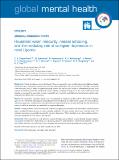| dc.contributor.author | Cooper-Vince, C. E. | en_US |
| dc.contributor.author | Kakuhikire, B. | en_US |
| dc.contributor.author | Vorechovska, D. | en_US |
| dc.contributor.author | McDonough, A. Q. | en_US |
| dc.contributor.author | Perkins, J. | en_US |
| dc.contributor.author | Venkataramani, A. S. | en_US |
| dc.contributor.author | Mushavi, R. C. | en_US |
| dc.contributor.author | Baguma, C. | en_US |
| dc.contributor.author | Ashaba, S. | en_US |
| dc.contributor.author | Bangsberg, D. R. | en_US |
| dc.contributor.author | Tsai, A. C. | en_US |
| dc.date.accessioned | 2018-01-18T02:26:47Z | |
| dc.date.issued | 2017 | en_US |
| dc.identifier.citation | Cooper-Vince, C. E., B. Kakuhikire, D. Vorechovska, A. Q. McDonough, J. Perkins, A. S. Venkataramani, R. C. Mushavi, et al. 2017. “Household water insecurity, missed schooling, and the mediating role of caregiver depression in rural Uganda.” Global Mental Health 4 (1): e15. doi:10.1017/gmh.2017.14. http://dx.doi.org/10.1017/gmh.2017.14. | en |
| dc.identifier.issn | | en |
| dc.identifier.uri | http://nrs.harvard.edu/urn-3:HUL.InstRepos:34651846 | |
| dc.description.abstract | Background: School attendance rates in sub-Saharan Africa are among the lowest worldwide, placing children at heightened risk for poor educational and economic outcomes. One understudied risk factor for missed schooling is household water insecurity, which is linked to depression among women and may increase children's water-fetching burden at the expense of educational activities, particularly among children of depressed caregivers. In this study conducted in rural Uganda, we assessed the association between household water insecurity and child school participation and the mediating pathways behind these associations. Method We conducted a population-based, cross-sectional study of female household heads (N = 257) and their children ages 5–17 (N = 551) in the rural regions surrounding the town of Mbarara, in southwestern Uganda. We used multivariable linear regressions to estimate the association between water insecurity and missed schooling. We then assessed the extent to which the association was mediated by caregiver depression. Results: Among children, water insecurity had a statistically significant association with the number of missed school days (a standard deviation increase in water insecurity resulted in 0.30 more missed school days in the last week). The estimated association was partially mediated by caregiver depression. When stratified by sex, this mediating pathway remained significant for boys, but not among girls. Conclusions: Water insecurity is a risk factor for missed schooling among children in rural Uganda. Caregiver depression partially mediated this relationship. Also addressing caregiver mental health in water insecure families may more fully address the needs of sub-Saharan African families and promote educational participation among youth. | en |
| dc.language.iso | en_US | en |
| dc.publisher | Cambridge University Press | en |
| dc.relation.isversionof | doi:10.1017/gmh.2017.14 | en |
| dc.relation.hasversion | http://www.ncbi.nlm.nih.gov/pmc/articles/PMC5719478/pdf/ | en |
| dash.license | LAA | en_US |
| dc.subject | Etiology | en |
| dc.subject | Child | en |
| dc.subject | depression | en |
| dc.subject | schooling | en |
| dc.subject | water insecurity | en |
| dc.title | Household water insecurity, missed schooling, and the mediating role of caregiver depression in rural Uganda | en |
| dc.type | Journal Article | en_US |
| dc.description.version | Version of Record | en |
| dc.relation.journal | Global Mental Health | en |
| dc.date.available | 2018-01-18T02:26:47Z | |
| dc.identifier.doi | 10.1017/gmh.2017.14 | * |
| dash.authorsordered | false | |


